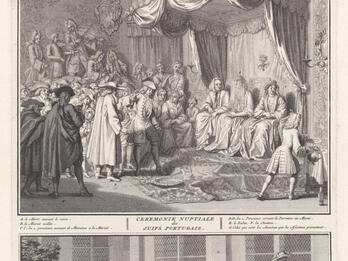Discursos predicaveis que o doctor Haham Yeoshua da Silva pregoe no Kahal Kados Saar a Samayim (Preaching Discourses That the Haham Josua da Silva Preached in the Shaar Asamayim Synagogue)
1.
A King had many natural sons, whom he handed over to lords and princes, his vassals, to rear and feed, and he had another legitimate son whom he greatly loved, and brought him up with him in his palace, and he guided him himself. This son grew up, was a traitor to his father, and, seeing as he obtained from his father whatever he needed, went to ask help from foreign princes and kings; he greatly irritated his father, the king, who disowned him and banished him from his palace. He then discovered he had many enemies, and all his brothers and the princes who raised them sought to blot out his memory from the world, because they realized that as long as he remained alive, he would pay them no honor. However, the king intended only to punish his son, placing him in a predicament so that he would become humiliated and return to his first state. So that his natural sons, with the help of their princely tutors, would not take advantage of his intention, he gave their mentors to understand that, as his desire was to retain his [legitimate] son, these princes should take great care and make an effort to defend the king’s son insofar as, should they harass him, they should not extinguish his memory from the World.
2.
The commentary on this homily is clear. The king is our Sovereign Lord, Creator of the world, King of Kings; all people are His creatures, delivered to the angels, their protectors. Israel is the only people of God, His legitimate son, as He said, Israel is My son, even my firstborn (Exodus 4:22); You are the children of the Lord your God (Deuteronomy 14:1). He raised them in His Palace, in the Holy Land, with the Holy Temple, the Palace of the Lord, and by His divine hand, they were immediately provided for and He governed all their circumstances, by His own Providence. They sinned as Israel, they offended their divine Father, who exiled them from His land and from His palace, and hid from them the face of His divine protection, as He says: And I shall surely hide My face from them (Deuteronomy 31:18). And they soon discovered endless hidden enemies, as the prophet Jeremiah says: All her companions were false to her; they became her enemies (Lamentations 1:2). They sought to sever her memory from the world, as the Psalmist says: For they said, “Go and let us cut them off from being a people and the name of Israel shall no longer be remembered” (Psalms 83:4). But since divine attention would never allow Israel to be annihilated, He entrusted to them the honor of His holy name rather than castigate and punish them for their sins, as the prophet Jeremiah says: And I shall punish you justly and I shall surely not leave you unpunished (Jeremiah 30:11). Since Israel was outside the protection of divine grace, abandoned by Him and without any protecting angel to defend them from so many princes and people seeking to annihilate them, they would have easily preferred for God to save them from complete obliteration; He commanded the angels Michael and Gabriel to watch over His people and protect them during the exile and defend them from protectors and people opposing them. This protection and defense is the war that the angel Gabriel relates to Daniel that he has with the protector of Persia, with whom he had just waged war when Greece’s protector came and he says concerning this that there was no warrior who could stand with me against them, except for Michael, Your Prince, who is the Prince of Israel and their protector during the exile, for, in reality, the Blessed God is the universal Lord of the whole world; He is their protector and Israel is His portion and the lot of His Inheritance.
3
From all this, it follows that the Israelite who serves any entity besides God, even though he not consider it to be a deity, but humbles himself before it and seeks its intercession so as to achieve, thereby, divine grace, is an idolater. And since this article with which we are presently dealing is where all the precepts regarding the prohibition of idolatry are to be found, our teacher Moses rightly inserted that one must not take any creature as an intermediary between man and God, because this was the beginning and origin of all idolatry in the world and it is not a teaching of our teacher Moses, which is the substance of this article, not by an intermediary, because it is a particular precept, rather than this article, according to which one must serve only God with praises and prayers, there follows the prohibition of this act that no creature in the world may be considered a deity or the intermediary thereof.
Credits
Published in: The Posen Library of Jewish Culture and Civilization, vol. 5.



